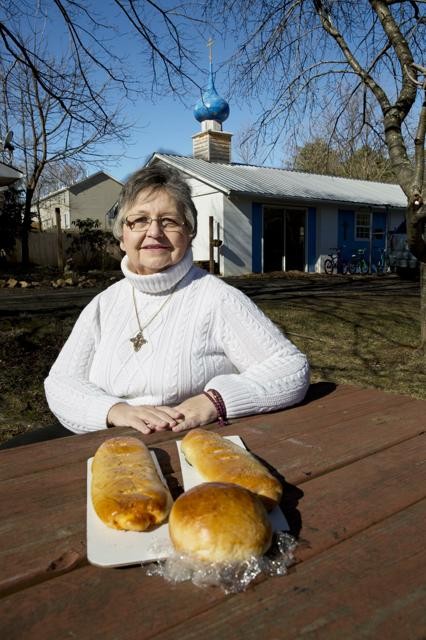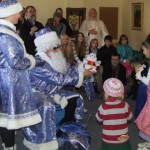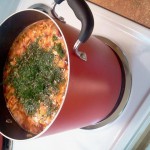- FOOD AND FAMILY: St. Nicholas Russian Orthodox Church member Andrea Robel leads a committee that bakes traditional kolachi pastries from her mother’s 100-year-old recipe. The group sells the pastries as a church fundraiser. Photo by Michael Carlebach
- GRANDFATHER FROST: Andrey Medeve and ??? play Grandfather Frost and the Snow Maiden at St. Nicholas Russian Orthodox Church’s recent Yolka celebration. Photo by Gina Smith
- HEARTY FARE: Euromarket owner Vadim Apolka says sausage and smoked whole fish are two items that sell well to his Eastern European customers in the winter months. Photo by Margaret Williams
- AS YOU LIKE IT: Ukraine native Sergiy Matvyeychenko says that making great borscht is all about experimentation and adding ingredients you like. Courtesy of Sergiy Matvyeychenko
In a series of stories, Xpress is exploring the cold-weather food traditions of some of Asheville's ethnic communities. This installment takes a look at the culinary customs of Asheville residents who hail from Eastern Europe.
A fish in a fur coat. It sounds like an image from a surrealist painting, but when talking about traditional winter foods, this is the first thing that would come to mind for many members of Asheville’s large Eastern European community, says Vadim Apolka.
Called shubo or selyodka pod shuboi in Russian, “herring under a coat” is a layered salad of salted herring, green onions and shredded boiled beets and potatoes wrapped in a blanket of beet-infused mayonnaise. It is very popular around Christmas and New Year’s, possibly due to its red, white and green color scheme, says Apolka, owner of the Eastern European food store and café, Euromarket, in West Asheville. But Apolka says his children, who have grown up here, do not consider this dish a favorite — festive appearance and whimsical name notwithstanding. “They are not too keen on herring,” he says.
Apolka emigrated to the U.S. with his wife Tanya from their native Belarus 16 years ago. He opened Euromarket in 2005 to provide a taste of the old country to the thousands of Slavic immigrants who have chosen Asheville as their home. These families, he says, brought with them food traditions rich with the flavors of smoked sausage, fish and bacon; vibrant with earthy vegetables like beets, carrots and potatoes; and sweet with decadent cakes and fruit-filled desserts.
In the winter months, Apolka says, his customers tend to buy a lot of whole smoked mackerel and salmon; fancy Western European cakes and pastries, such as the multilayered Napolean; and salmon caviar, which is a popular party food. And, he says, a ubiquitous dish any time of year, but especially in the cold months, is pelmeni, a smaller, Russian version of Polish pierogi. The dumplings are traditionally stuffed with pork or veal and eaten hot with sour cream or in a soup. There are also dessert pelmeni that can be stuffed with sweet cheese or cherries.
“The kids love pelmeni,” Apolka says. “They are more American, but there are a few [traditional] dishes they eat with pleasure.”
The Eastern European community in Asheville, according to Apolka, is centered around a handful of Slavic churches. Many members of the community came to the U.S. seeking religious freedom during the repressive days of the Soviet regime, so to get a taste of Eastern European food traditions, says Apolka, you can start by going to church.
The church connection
It is noon on a recent frozen Tuesday. With schools closed because of ice and temperatures hovering around the zero mark, much of Western North Carolina is hiding out in heated living rooms or basking in the warmth of office radiators. But at St. Nicholas Russian Orthodox Church in Fletcher, a group of adults and children has just braved the frigid walk between the church and the outbuilding that serves as the congregation's gathering space — and they are ready to party.
Although the new year has come and gone, a decorated evergreen reigns as the centerpiece of the open room, and a modest potluck spread has been laid out in a kitchen area in the rear of the building. Small children dressed in their holiday best hover expectantly around the tree, and several grown-ups are eyeing the food table with obvious interest. After a blessing, the festivities begin when a man and woman dressed like shimmering blue versions of Santa and Mrs. Claus burst into the room with a bag of gifts.
This is Yolka, the traditional Russian Christmas celebration that falls on Jan. 7 each year in accordance with the Julian calendar. Yolka is a feast day that breaks the weeklong fast leading up to the Nativity, the birth of Jesus Christ, in the Russian Orthodox Church. The metallic-blue-clad Claus couple is actually two church members playing the roles of Ded Moroz and Snegurochka, or Grandfather Frost and his granddaughter, the Snow Maiden. After the pair hands out the gifts in their sack and leads the children in some games, it's time for the feast to begin.
And everyone seems ready to eat. According to church member Andrea Robel, during the days of fasting that precede Yolka, no dairy products or meat can be consumed. “Not even butter,” she says. The fast continues through the evening of Jan. 6, when the church hosts the highly ritualized Holy Supper, which features food symbolic of events associated with the birth of Christ. Common dishes include raw garlic dipped in honey (to symbolize the sweetness and bitterness of life), mushroom soup, bobalki (Slavic bread balls with honey and poppy seeds) and pierogi filled with sauerkraut, potato or prune jam. When the fast breaks with Yolka, the congregation is ready for some meat and cheese.
Although this Yolka feast resembles a church potluck one might find anywhere in the U.S. — platters of deviled eggs, cold cuts, pasta and salads grace the table — Robel says more traditional Yolka dishes include meat-stuffed cabbage rolls known as holupki, roast beef or ham, kielbasa and other sausages and, perhaps, kolachi, a pastry filled with fruit, nuts or poppy seeds. Robel, whose mother came to the U.S. from Czechoslovakia via Ellis Island, leads a committee that bakes kolachi from her family’s century-old recipe and sells them during the Christmas season as a fundraiser for the church.
According to church member Mary-Jo Dukas, food, religion and community are deeply connected in the Russian Orthodox community. “There is always food,” she says of church activities. “Even after services, we always serve a meal.” And as with Holy Supper and the Yolka feast, food is an essential part of many of the church’s liturgies, some of which have remained unchanged since 300 A.D.
Robel echoes this sentiment. “It’s religion and it’s community,” she says. “The church and our lives are integrated.” She adds, “The traditions of food also bridge the gap of the past to remind us of from where we came … and takes us into the future to teach the next generation about the importance of the Orthodox Church, family and lifestyle.”
The family-food connection
“Food is a huge part of everything for us,” says Lana Fedun. Like many Eastern European immigrants, church is a central part of life for Fedun — she is a member of the Christian Church of Hope, a Slavic evangelical congregation on Emma Road. However, she says, the church has little to do with what she eats. “Our traditions are more cultural,” Fedun says. “They aren’t related to the church.”
Born in Latvia to Ukrainian parents, Fedun moved to the U.S. as a child in 1989. When her family crossed the Atlantic Ocean, they brought with them an oral food tradition — based on meat, potatoes and cabbage — that would forever link them with their homeland.
For holidays and gatherings, regardless of the season, Fedun says, “We always make way more food than people can really eat.” Cabbage rolls stuffed with meat; a rice, vegetable and meat dish called plove; and katleti, a meatloaf-like patty topped with gravy — are all commonly served. Lamb shishkebabs, she says, are a must at parties. And then there are potatoes.
“[We eat] any kind of potato in any form,” she says. “It's like a survival thing. If you don't know what to make, there's always potatoes.”
Fedun says food preparation in her community tends to be a family affair. “The kids love to get involved,” she says, mentioning a cheese-filled pastry called sochniki that her young nephews enjoy helping to make.
Fellow church member Tatyana Nemshom, who came to the U.S. from Belarus 20 years ago seeking freedom from the religious restrictions of the Soviet Union, says this active participation is part of the Slavic tradition of handing down family recipes orally and by example. “Nobody uses cookbooks,” says Nemshom. “Maybe for cakes or cookies … but not for savory foods.”
Fedun agrees. “Recipes are never really written; it's all just told and watched. It's like, 'Come over and see and then you'll learn.'”
This tradition of shared experience and knowledge not only nurtures family and community bonds, but also reaches across continents and oceans to forge a powerful link to a shared homeland and heritage. “Certain things,” says Fedun, “certain dishes, you can just smell — just the tiniest smell — and you remember where you came from; you think of where you were born.”
Andrea Robel is now taking orders for paska, traditional Ukrainian Easter bread. $8 for large loaves and $5 for small loaves. Robel is also selling apricot, poppy and walnut kolachi bread for $14 per loaf. All loaves must be preordered. For details, visit saintnicholasroc.org.







Before you comment
The comments section is here to provide a platform for civil dialogue on the issues we face together as a local community. Xpress is committed to offering this platform for all voices, but when the tone of the discussion gets nasty or strays off topic, we believe many people choose not to participate. Xpress editors are determined to moderate comments to ensure a constructive interchange is maintained. All comments judged not to be in keeping with the spirit of civil discourse will be removed and repeat violators will be banned. See here for our terms of service. Thank you for being part of this effort to promote respectful discussion.